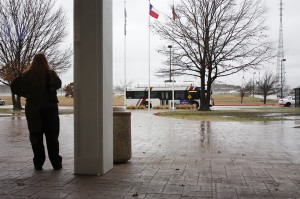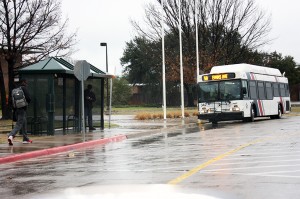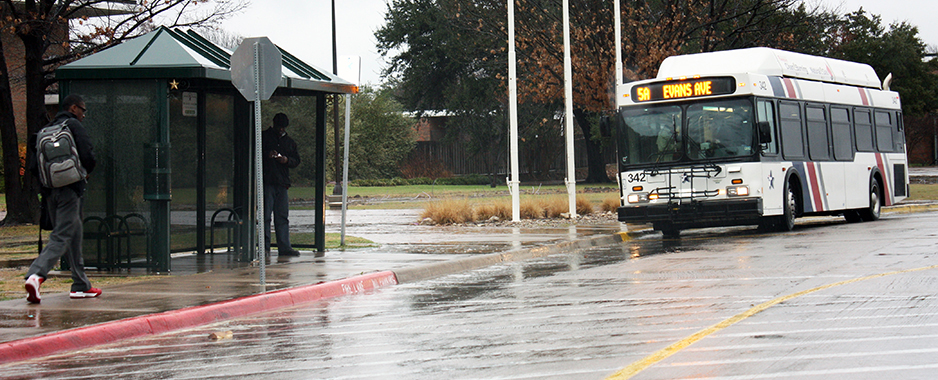

Photos by Audrey Werth/The Collegian
By Audrey Werth/tr news editor
Lack of public transit derails some students
TCC students who rely on public transportation often find it hard to get to the campus they need since TR and South campuses are the only ones that have public transportation routes.
“The TR Campus was very strategically located in the center of downtown because the lowest areas of educational attainment in Tarrant County were within a five-mile radius of central downtown,” said Serafin Garcia, TR director of campus strategic planning.
About eight or nine years ago, a bus route stopped on NW Campus, but the small ridership didn’t justify maintaining a stop there, officials said. On South, enough students ride the bus to keep the route.
“So that would be how the T would justify how do we get routes to each of these campuses,” Garcia said. “You just need to show that there’s a demand for it.”
The TR Student Government Association has been concerned for several semesters about the limited transportation available between campuses. For some students, the lack of public transportation to TCC campuses can derail their education. Others spend hours driving between campuses each week to take all the courses they need.
Some students spend a lot of time driving, but if they could ride a bus, they could study, Garcia said.
TR student Connie Formby is concerned that TCC doesn’t have a culture for riding the bus.
“People who are in the most unfortunate times of their lives and undoubtedly at the lowest point in their life ride the bus,” she said.
People who can drive, will — which makes it tough to show significant demand for public transportation, Formby said.
Patricia Bishop, a member of the student government committee working on a proposal for an intercampus transportation system, had to change her degree.
“I originally wanted to study real estate, but all of the classes I needed were located on a campus I couldn’t get to,” she said.
TR student Mason Perkey, also a member of the SGA committee, hopes to make transportation easily accessible for students in the future.
Perkey, an engineering major, has also found it hard to get all of the courses he needs.
“TR Campus offers Calculus I and II, but for Calculus III, I am forced to go to the NW Campus,” he said. “I’ve just been fortunate enough to afford a car, but I can imagine that for other students it’s much more difficult to complete their desired degree.”
Most TCC students are pursuing Associate of Arts degrees, so most of the classes they need are available on every campus.
“I don’t have so much difficulty getting to places I want to go to because I’ve not wanted to take many classes on other campuses,” Formby said.
Students relying on public transportation, who hope to pursue a more specialized degree or certificate, can find it hard — if not impossible — to get to the campus they need.
“One of the major obstacles that I’ve found going from homelessness to being in college is some of the classes that are available are only available on certain campuses,” said Robert Tracy, a once-homeless military veteran.
For students traveling long distances, public transportation could give them some of the time they spend driving to study or prepare for class. For other students, public transportation between campuses could mean the difference between completing a degree or not.
“I think we’re letting a lot of people slip through the cracks by not having either all of the classes available on all of the campuses or having a way to get to all of the campuses,” Tracy said.
The issue in making all classes available on each of the five campuses is affordability and demand. A lot of research goes into deciding on which campus to locate each degree program, officials said.
“We investigate,” said Jane Harper, associate vice chancellor of academic affairs. “We look for the need for the program. We look for the number of people being employed in an area who may benefit from the program.”
The program must receive approval from the accrediting system, and there must be enough faculty to support it, Harper said.
“When new programs come in, it’s usually at the request of faculty who see a tie between what they are teaching and community interest or need,” she said.
“We work on what’s going to move the majority of students forward toward their educational goals,” said Adrian Rodriguez, TR vice president of student development services. “Being able to go from campus to campus affects a good number of our students, so we want to be cognizant of that and seek ways to provide support to them.”
Students said those who do not have access to transportation end up falling between the cracks because they are not located near enough to the campus best suited for the degree they wish to pursue.
“We definitely recognize how much of a challenge it is, but it’s not an easy matter to solve or that probably would have been tackled long ago,” Rodriguez said.






















